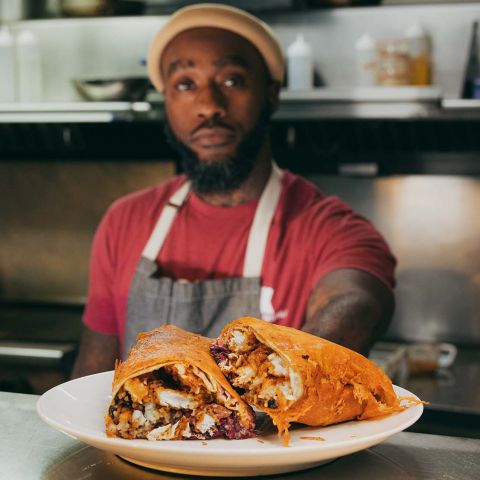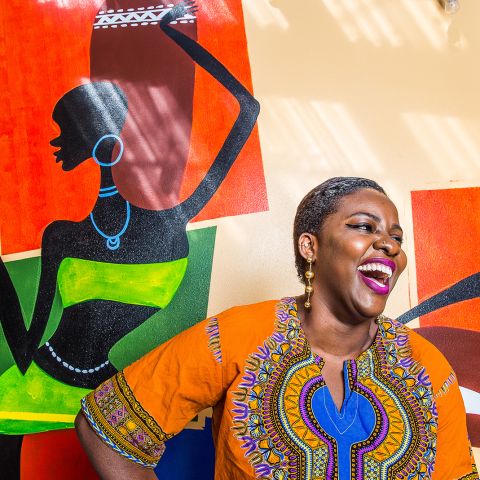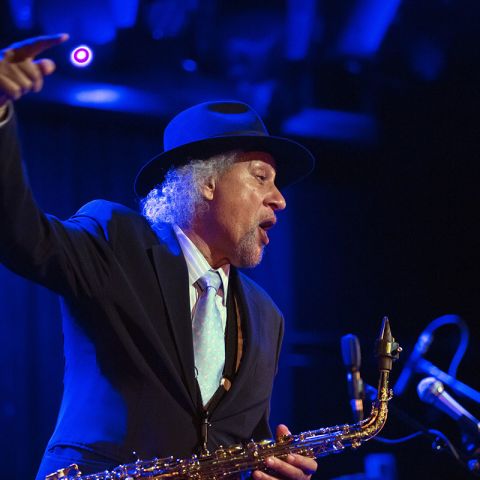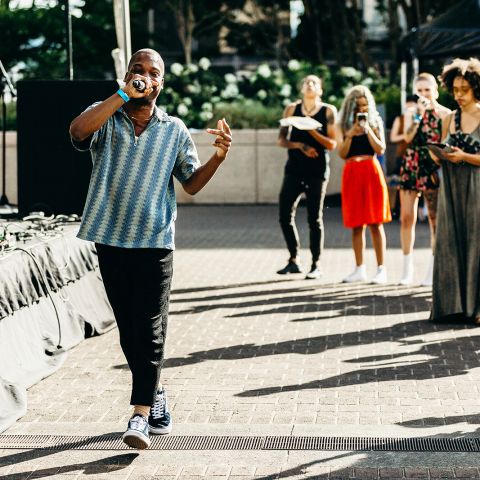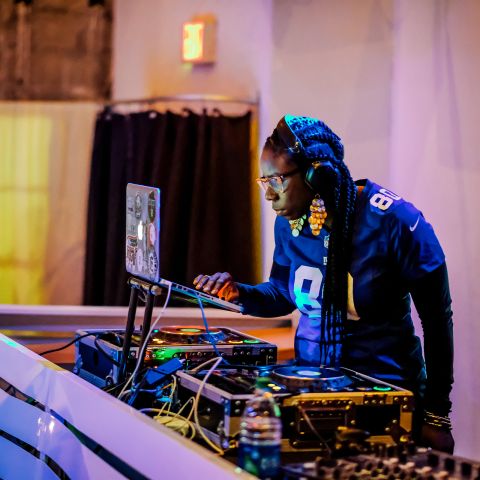Black Community
Portland’s Black community reaches beyond its historic roots to create world-class connections and relationships.
With a diverse range of organizations and businesses, Portland’s Black community provides visitors with resources and a friendly welcome. The Rose City has a vibrant Black culture. Explore the city’s Black history, Black cultural events, and Black-owned businesses and restaurants.
Black History in Portland
This section was produced in collaboration with The Skanner News
Black pioneers were among the earliest non-Native people to settle in Oregon, but it was not until World War II that thousands of African Americans migrated to the Northwest to find work in the shipyards and keep the railroads running. Today, Portland is home to more than 41,000 Black Americans, most living on the east side of the Willamette River.
Despite daunting barriers and discrimination, Black Americans have made important contributions to Oregon in politics, medicine, the environment, sports, culture and the arts. Portland’s many parks, for example, make the city one of the greenest in the nation. That’s thanks largely to Charles Jordan, a former city commissioner who championed green spaces in cities, far ahead of his time. In July 2012, the city renamed a community center in Jordan’s honor.
Notable Black Portlanders
Notable Black Americans in the Portland entertainment scene include actor Danny Glover; pianist Janice Scroggins; Grammy-winning jazz bassist Esperanza Spalding; saxophonist Mike “Philly” Phillips; jazz drummer Mel Brown; jazz singer Julianne Johnson-Weis; R&B singers Liv Warfield and Andy Stokes; funk performer/producer Tony Ozier; and rappers Cool Nutz, Rose Bent, Soul P, Luck One, and Illmaculate.
Black Americans in Oregon Politics
The early 2000s marked a historic milestone as three Black people, former state senators Margaret Carter, Avel Gordly and Jackie Winters, served in the Oregon State Legislature simultaneously. These three senators made landmark reforms for both Black communities and Oregon as a whole, including removing the last remnants of anti-Black exclusionary legislation from Oregon’s constitution
- Margaret Carter became the first Black woman elected to the Oregon Legislative Assembly in 1984. She advocated for education for those most in need, and legislation to observe Martin Luther King Jr.’s birthday as a state holiday. Carter retired from the Oregon Senate in 2008 to head up the Department of Human Services. In 2011, her alma mater and former employer, Portland Community College, named the Senator Margaret Carter Technology Education Center in her honor.
- Portland native Avel Gordly was elected to the Oregon House of Representatives in 1991 and became the first Black woman elected to the Oregon State Senate in 1996. She served a total of 17 years before retiring from office in 2008 to become an associate professor in the Black studies department at her alma mater, Portland State University. As senator, Gordly helped pass legislation requiring statewide multicultural health service. In 2008, Oregon Health and Science University renamed its behavioral health center the Avel Gordly Center for Healing, and committed to meeting mental health needs in the Black community. Gordly published her memoir in 2011, “Remembering the Power of Words: The Life of an Oregon Activist, Legislator, and Community Leader.”
- Senator Jackie Winters moved to Portland with her family during WWII along with many other Blacks who sought gainful employment in the shipyards and railways. Her father launched a short-lived daily newspaper, which helped shape Winters for public debate and advocacy. As an adult, Winters moved to Salem, Ore., and gained acclaim for her regional restaurant chain, Jackie’s Ribs. Winters was elected to the Oregon House of Representatives in 1998, becoming the first Black Republican ever to serve in the Oregon Legislative Assembly. She won election to the Oregon Senate in 2004 and still holds office. She advocates for increased state education funding and helped create the Oregon Food Share Program, which has grown to include a statewide system of food banks. She sits on the powerful ways and means committee that oversees the state budget and is a popular guest on many national television forums.
Black Americans in Portland Education
Portland Community College (PCC), Oregon’s largest and most diverse college, has been helmed by three Black men since 2004. Dr. Preston Pulliams is PCC’s fifth district president and CEO. In 2010 he was named the Regional CEO of the Year by the Council for the Advancement of Support of Education. Dr. Algie Gatewood was president of the Cascade Campus in Northeast Portland — one of PCC’s largest, most diverse campuses. Harold Williams, a self-proclaimed “junkyard dog,” has staunchly helped create and defend policy for more than 20 years as chairman of the board. Though it is not their primary objective, these men have played a part in paving the way for minority leadership.
Another notable Black-led education program is Self-Enhancement Inc (SEI). Tony L. Hopson Sr. started SEI in 1981 as a summer basketball camp for at-risk youth. Some 30 years later, it is a fully accredited academy serving primarily Black students ages 8-25 in urban North and Northeast Portland. In 2010, SEI partnered with former NBA star Alonzo Mourning’s charity to replicate its program in Miami.
Making Strides Through Sports
Black Portlanders have come a long way since Bobby Robinson and Charles Williams broke color lines as high school sports stars in 1924, playing before huge crowds at the old Multnomah Stadium in Portland. Both went on to be the first Black athletes to play at the University of Oregon.
Since its inception in 1970, the Portland Trail Blazers NBA team has featured scores of Black players. Michael Harper and Brian Grant are just a few who still work with the organization and call Portland home. In 2007, the franchise hired Larry Miller as their first Black president. Miller was also the first Black executive at Jantzen Sports and Nike’s first Black vice president. In 2011, the Trail Blazers appointed their first female Black chief operating officer, Sarah Mensah. Mensah received national press and helped establish a Portland chapter of the National Association of Black Sports Professionals.
Beloved former Blazer “Rasta man” Brian Grant, who still calls Portland home, was diagnosed with Parkinson’s disease in 2008. Since then, the Brian Grant Foundation has hosted a popular event to raise funds for Parkinson’s education and awareness. “Shake It Till We Make It” consists of a celebrity gala and golf tournament and has featured Michael J. Fox, who lives with the disease, and Muhammad Ali (who passed away in 2016).
Playing a Role in Portland’s Rose Festival
One of Portland’s most celebrated events is the world-famous Portland Rose Festival, held each year in May/June with highlights such as the Rose Festival Parade, a waterfront carnival and the selection of a queen from among princesses representing every Portland high school. In 1980, Robin Marks became the first Black Rose Festival Queen. This honor includes a college scholarship and has since been bestowed upon several other Black women.
In 2007, the Portland Rose Festival reached two notable landmarks: celebrating its 100th anniversary and being led by its first Black president, Leslie Goodlow-Baldwin. Leslie led the festival to top honors that year, winning the highly coveted Grand Pinnacle Award from the International Festivals & Events Association.
Annual Events
Support and celebrate Portland's Black community at these annual festivities.
Support Black-Owned Restaurants in Portland
Brought into focus by local organizations, explore the city’s diverse and delicious Black-owned food carts, restaurants and markets in Portland.
Black History Month in Portland
Every February, Americans of all races and backgrounds celebrate Black History Month. Celebrate with these Portland events.
Biamp Portland Jazz Festival
The Portland Jazz Festival returns every February with a stellar series of concerts and events celebrating Black History Month.
Black Community Events
Portland’s Black community celebrates a variety of events throughout the year.
January
The annual Martin Luther King Jr. Breakfast, presented by The Skanner Foundation, typically includes a national speaker discussing a current issue and is always held on the King holiday. Later that day, the World Arts Foundation hosts the Annual Rev. Dr. Martin Luther King, Jr. Tribute celebration at Highland Christian Center.
February
In celebration of Black History Month, the Biamp Portland Jazz Festival is a citywide celebration of the art form created by Black Americans. The festival honors special jazz anniversaries and legends, along with feature performances by legendary artists
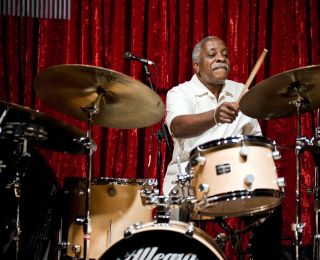
Every year during Black History Month, the NBA’s Trail Blazers host a Celebration of Black History at the Moda Center, featuring a pre-game celebration, special performances, unique retail items and fundraising efforts to support local nonprofits.
Ongoing since 1991, the Cascade Festival of African Films is hosted by Portland Community College. The festival features documentaries and short films by established and emerging African directors from over a dozen countries.
May
The yearly Vanport Mosaic Festival showcases stories and events focused on underrepresented voices at multiple venues throughout Portland. The festival’s mission is to “amplify, honor, present, and preserve the silenced histories that surround us in order to understand our present and create a future where we all belong.”
June
Celebrate Juneteenth with a freedom parade and a picnic in North and Northeast Portland on the Saturday closest to June 19. This uniquely Black holiday commemorates June 19, 1865, when slaves in Texas received word that Lincoln had abolished slavery. In Portland, observation of the holiday began in the shipyards in 1944 by Clara Peoples.
The last weekend in June, the three-day Good in the Hood Multicultural Festival features live music, food, games and arts that showcase the rich culture of North and Northeast Portland.
July
The Waterfront Blues Festival brings together top national stars and Portland’s local music community to downtown Portland’s Waterfront Park over the Fourth of July weekend.

Credit: NASHCO Photo
The longest-running free jazz festival west of the Mississippi is held in verdant Cathedral Park below the historic St. John’s Bridge over a mid-July weekend. The free Cathedral Park Jazz Festival is one of the most relaxed events in the city.
September
The MLK Dream Run is a professional chip-timed 5k, 10k and 15k race that takes participants through the beautiful streets of the Soul District. The event is a celebration that features music, food and fun while honoring Dr. King’s “I Have a Dream” speech. The event is billed as one of the most multicultural runs in the Pacific Northwest, attracting many volunteers and runners from the Black community.
Explore Black Communities Events
Discover and celebrate the Black Community at these upcoming events in Portland.
The Soul District: The Heart of the Black Community
The following sections were produced in collaboration with Flossin Media
The historic heart of Portland’s Black community is the “Soul District” of inner North and Northeast Portland, deemed the “Soul of Portland” in the 1990s as much because of its courage to sustain as for its cultural vibrancy. In this creative center, Portland’s black residents have fostered business development, artistic expression, multicultural preservation and community advocacy.
This is where you will find civic institutions such as the Urban League of Portland, Self Enhancement Inc., the Black United Fund, Imagine Black, the Coalition of Black Men Portland and the Prince Hall Masons, as well as barbershops, salons, Black-owned food cart pods, African groceries, music, arts and culture. We invite you to get your soul on!
Black-Owned Businesses
Visit these local favorites for delicious food, wine, coffee, sneakers and more.
Heading Out
Take a stroll through Portland, guided by tales of freed Black slaves, on a Portland Pioneers of Color Walking Tour, and attend a lecture by Oregon Black Pioneers, a nonprofit group that gives interactive presentations on the state’s rich Black heritage at schools, libraries and historical sites throughout Oregon. Visitors and locals alike can also check out the Black Resource Collection at the North Portland Library to learn about some Black residents who have impacted the city. For those who would like to purchase books or gifts to take home, Third Eye Books is a Black-owned-and-operated shop that offers African-centered items for everyone to enjoy.
Take a tour of our “Albina Murals,” a collection of murals and public art in North and Northeast Portland created by local painters and sculptors, then view multicultural art exhibits, dance and performances at the Interstate Fire Cultural Center.
Visit the Alberta Arts District to explore local music, food and art. Alberta Street is home to a popular gallery walk and street fair called Last Thursday, which is held the last Thursday of every month (and is particularly popular during the summer months).
Update your do and visit Pearl Hall at Dean’s Beauty Salon. Check out Champions in the heart of the historic Black neighborhood.
Mentioned Elsewhere Online
Black-Owned Business Network
Food & Drink
Located atop a hill in northeast Portland’s Hollywood district Clyde’s Prime Rib Restaurant & Bar features an elegant dining room –think red velvet booths and a roaring fireplace – and live jazz, R&B and blues in the bar. Date night dining is perfect at Olive or Twist, a martini lounge in Portland’s trendy Pearl District.
Amalfi’s Italian Restaurant, headed by its third-generation owner, serves up Italian trattoria cuisine, including pizza, cocktails, beers and wine.
Experience the taste of the Soul District by visiting food cart pods featuring a variety of authentic ethnic food. Find the huge, spicy Southern-style wings and salty jojos at Alberta Market.
Meet the first known Black winemaker in Oregon at Abbey Creek Winery, where Bertony Faustin brings “the soil to the glass” at his North Plains winery.
African Food in Portland
Visitors looking to taste flavorful dishes from faraway Ethiopia, Morocco and Cote d’Ivoire can sample them stateside. In Portland, the African food scene thrives in many hidden-in-plain-sight spots throughout the city. From Black Star Grill’s famous jollof rice to Akadi’s beef suya or the true West African specialty of slow-cooked goat meat in a spiced tomato stew, these African eateries offer the full culinary experience.
Established in the 1990s by Ethiopian immigrant Alem Gebrehiwot, Queen of Sheba is one of the oldest African restaurants in the city. Check out their amazing platters of food that delight vegan and non-vegan diners alike, including homemade ginger juice, thyme tea or spicy chai.
Nightlife
Since 1921, Billy Webb Elks Lodge has served the Black community as a YWCA, a USO club and a safe haven for those fleeing the Vanport floods in the 1940s.
Hip-hop, reggae and African dance hall: Portland’s young-adult dance scene is a kaleidoscope of trendy modern venues such as Trio Lounge and small “juke-joints” scattered throughout the city.
Radio Stations
- KBOO 90.7 – An eclectic mix of hip-hop, politics, Afrobeat and more
- JAM’N 107.5 – Party hits and throwback jams
- KMHD 89.1 – Jazz
- KOPB 91.5 – Oregon Public Broadcasting
- LIVE 95.5 – Hip-hop and top 40
- NMBZ 96.7 – Featuring music representing the full Black experience
Black Portland’s Performing Art Scenes
For over 40 years, PassinArt, the longest-producing African American theater company in Oregon, has highlighted Black writers, performers and narratives on the stage. With three productions a year, this community catalyst also has youth programs to inspire and educate.
Portland is known for its thriving music scene, and much of the credit for building the city’s melodic reputation goes to the Black community. Portland’s jazz culture is extensive. Notable jazz artists from Portland include Esperanza Spalding, Dave Frishberg, Mel Brown and Jim Pepper.
Today, Portland’s hip-hop scene is also thriving. Despite discrimination and gentrification, hip-hop has found a way to survive in what has historically been a less-than-diverse city. One promising step forward happened in 2015 when then-mayor Charlie Hales designated October 15 as “Portland Hip-hop Day.” The city even has Green Muse, its first Historical Hip-Hop Dispensary. Notable hip-hop artists from Portland include Vursatyl (of Lifesavas), Libretto, Hanif, Cool Nutz, Mic Capes, Glenn Waco and Rasheed Jamal.
Music and the Black Community
Explore the city's thriving hip-hop, R&B and dance scenes.
Five Businesses Supporting Portland’s Hip-Hop Community
Believe it or not, the Portland hip-hop scene is vibrant and growing; visit these businesses to experience and support it.
The Portland Hip-Hop Scene
Take a deep dive into the past, present and future of the Portland hip-hop scene with our expert guide to the best rap artists, showcases, shops and more.
Niche Live Music Venues in Portland
These hidden gems are havens for jazz, punk, bluegrass, funk and more.
Sports & Adventure Clubs
Leisure Hour Golf, a multicultural organization focused on involving the Black community, hosts events for golfers of all backgrounds and skill levels at Portland’s many excellent golf courses.
Fishing, hunting, skiing, hiking — no trip to Portland is complete unless you experience some of the city’s outdoor adventures. Connect with these great Black-run organizations for guided opportunities to bask in the beautiful outdoors. Hike a peak with the African American Outdoor Association or bag a buck with the African American Hunting Association. Then hit the slopes with the Ebony Rose Ski Club, founded in 1984.
Was this page helpful?
